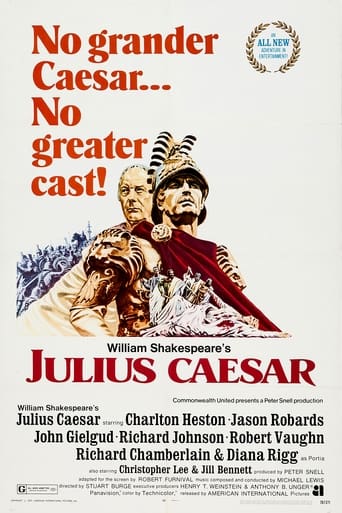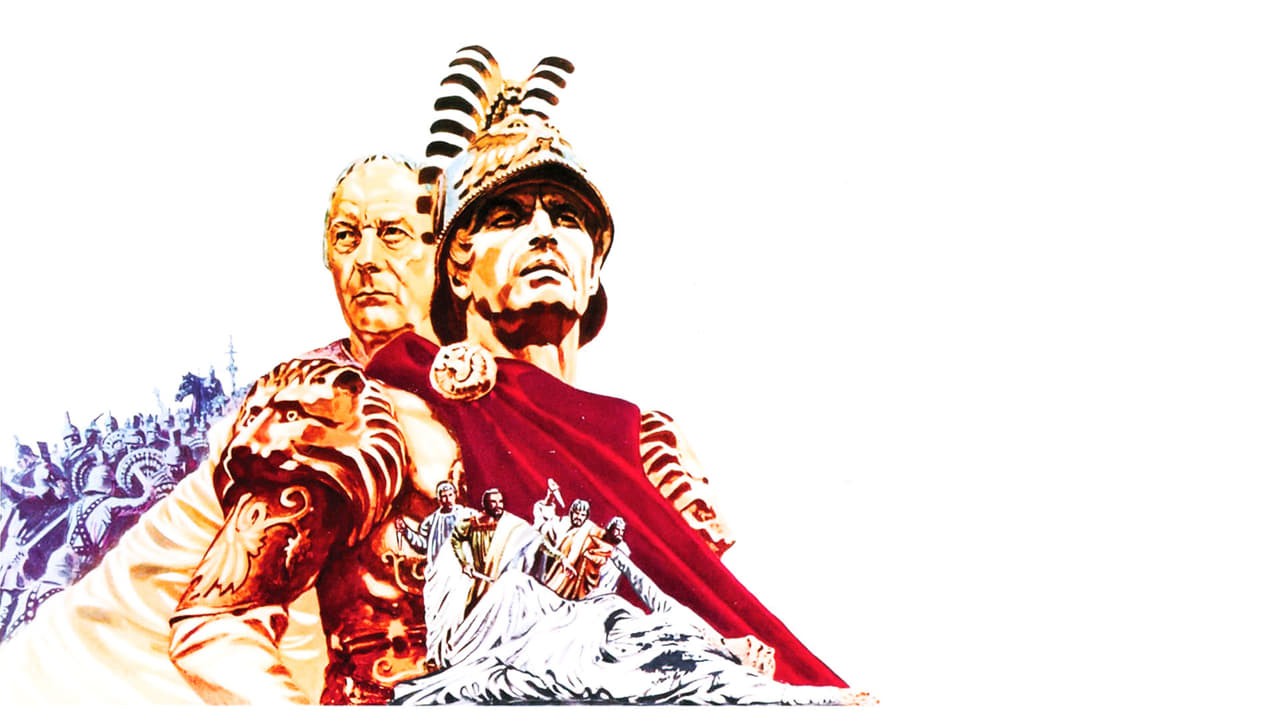judithnelson07
I've seen plenty bum Shakespeare, but Jason Robards as Brutus he takes me the cake. He resembled nothing so much as a barrel with a head on top. The rest of the cast was pretty good, however, especially Richard Johnson as Cassius (why wasn't HE Brutus), Diana Rigg as Portia and Charlton Heston as Antony. John Gielgud as Caesar does his lines beautifully, as always, but does not quite convey the menace and power of Caesar. (He was better as Cassius in the 1953 version.) Interesting here is the contrast in line delivery between Johnson and Robards; it makes you wonder why Cassius isn't the leader and hope of the conspiracy. Production values are sometimes dubious; but battle scenes are better than the cowboys-and-Indians fight in the 1953 version. Of course, the text is shortened, but all essential scenes are kept.
chrstphrtully
Of the entire Shakespearean canon, "Julius Caesar" is probably one of my five most favorite plays (and, yes, I have read all 38, counting Edward III), because it really does have a great deal to say about the complexities of politics, even in the current day. Unfortunately, this production seriously misses the mark.One of the core problems with the film is the cheapness of the production. Roger Ebert noted in his review of the film 40 years ago that the sets looked like they would wobble and fall if someone simply touched them, and he wasn't kidding. Equally problematic, however, is the poor dramaturgy of the play, as for key scenes it seems that key lines were removed at random, while more trivial lines were left in for simple convenience's sake. Stuart Burge directed one other Shakespearean play for film (Olivier's 1965 "Othello", which brilliantly used the limited scope of the budget to convey Othello's claustrophobic view of his own world as the play progressed), but this one seriously suffered from his minimal experience with medium, as the use of cheap effects (e.g., Caesar's 1970s-style appearance during at the end of the tent scene) clearly shows.The acting is truly disappointing. Jason Robards' performance as Brutus has historically come in for vitriol, and not without reason. At the outset, he is somewhat "zombieish", but the performance does improve somewhat at the piece goes on, with some nice work in the tent scene, and in his final scene with Strato. Charlton Heston as Antony, on the other hand, is completely unconvincing -- several of his key speeches ("O, pardon me, though bleeding piece of earthy" and "Friends, Romans, countrymen") are completely unconvincing -- indeed, the latter of these two is completely shallow, telegraphing Antony's motives from the outset, which really submarines the effect of what follows. Gielgud is all right as Caesar, as is Robert Vaughn as Casca, but Richard Chamberlain is outright embarrassing as Octavius, conveying a sort of pinup idea of the character, with little indication of how dangerous he truly is. Diana Rigg (Portia) and Jill Bennett (Calphuania) are all right, though their parts are edited beyond recognition (e.g., Portia is never given the opportunity to show her self-inflicted wound to Brutus, which really demonstrates who devoted she is to him).The only performance that really emerges unscathed is Richard Johnson, as Cassius, as only he seems to have a real idea for how to subvert his ego to the text and character -- the editing of the film clearly shows that much of his best work is badly edited, cutting off in the middle of key speeches (e.g., "Well, Brutus, thou art noble...") and embarrassing speeding his death scene to the point it looks like a Benny Hill spoof. Notwithstanding this, he still manages to project his role as a man who truly believes he is being marginalized by the hero worship of Caesar.Having directed this play myself, and being a great fan of several of its leads (Robards, Johnson, Rigg, Gielgud), I can't help but wonder what might have emerged from a different director and either different actors or actors at different points in their careers (e.g., Robards and Gielgud). Lord knows in the days of the Tea Party and Fox News (read, Antony's plea to the Plebeians), this play is ripe for revisiting.
bkoganbing
One of the things that I always thought about Julius Caesar is that in the life of one of the great movers and shakers of the ancient world, he's merely a figure in which all kinds of people at the end are busy weaving their schemes around, be it his death or his conferred immortality. Antony and Brutus are each worried about their place in Caesar's affections and Brutus figures he's lost out to Antony. It makes him an easy mark for Cassius's plots. After the dirty deed of assassination is done, it's Antony and Octavius though they are teaming up against the conspirators, you can tell both in this version and in the better Fifties version that MGM put out that they will soon be at odds.Charlton Heston is a strong Antony here, but unfortunately for the play to succeed you need an equally strong Brutus. That's not what you get in Jason Robards, Jr. For a man who in his time was considered the greatest interpreter of Eugene O'Neill, when it comes to Shakespeare the man was out of his league. No reflection on him, everyone has casting limitations.A real good interpreter of the Bard who played Cassius back in 1954 plays Caesar here. John Gielgud is equally fine in both versions. And Richard Johnson and Robert Vaughn are superb as conspirators Cassius and Casca. And Richard Chamberlain who was trying very hard to shed his Dr. Kildare image is fine as the cunning Octavian who Antony ultimately underestimates.Charlton Heston in his memoirs takes blame for casting Robards and Robards himself realized he was miscast. Oddly enough in that earlier version James Mason as Brutus was the best one in the film.
hokeybutt
JULIUS CAESAR (2+ outta 5 stars) It's hard to really say anything bad about Shakespeare... but, as far as film adaptations of his work are concerned, there are good ones and there are bad ones. This version, produced in 1970, is not actually *bad*... but it doesn't really do justice to the drama or the language of The Bard of Avon. The problem with most of the acting, particularly that of Charlton Heston, is that it seems to be more recitation than acting. There is more attention paid to annunciating the words forcefully than to creating actual human characters. Without the human dimension the film seems like nothing more than a poetry reading. The staging is also lacking in imagination and excitement... the cameras are just there to capture the faces on film, not to add anything to the cinematic experience. Still, there are worse ways to pass the time than to listen to great actors like Jason Robards, John Gielgud and Charlton Heston (among others) reciting great stage lines. "If we do meet again, why, we shall smile... if not, then this parting was well made."



 AD
AD



